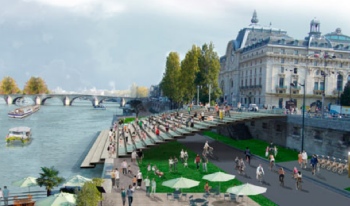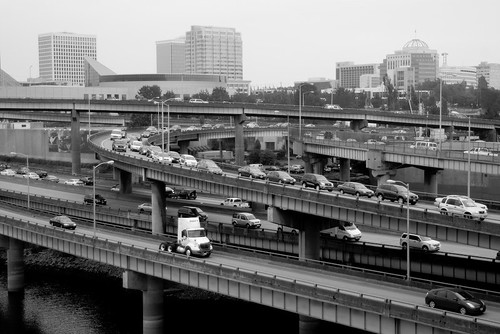
(Image: JC Choblet)
Oh Paris, first you helped me fall in love with bike sharing thanks to your revolutionary Velib system. Now you’ve captured my heart once again by giving your iconic riverfront back to the people. I can only hope it sparks as many copycats as Velib did.
As reported by The Guardian yesterday, the mayor of Paris will move forward with a project to decommission a 2.5 km segment of an expressway on the left bank of the Seine River between the Musée d’Orsay and the Pont de l’Alma (see image at right). Paris will replace surface parking lots and a busy highway with, “a riverside park, pedestrian promenades, floating botanic gardens, flower-market barges, sports courts, restaurants and even perhaps an archipelago of artificial islands.”
And here’s more from The Guardian:
The pedestrianisation of one of Europe’s most picturesque urban riversides means the death knell for the Seine’s non-stop riverside expressways. These were the pride of Georges Pompidou in the 60s when France’s love affair with the car was at its height. Opened in 1967 by him, under the slogan “Paris must adapt the to car”, the dual carriageway with perhaps the best view in France allowed a speedy crossing of Paris from west to east. But environmentalists have long complained it was a dreadful, polluting waste of architectural heritage.
Delanoë [the mayor] promised his new scheme would “give Parisians back their river”, “profoundly change” the city and provide “an opportunity for happiness” for residents. But the mayor, who will not stand for re-election in 2014, also has an eye on his legacy, seeking to be remembered as the man who finally ended Parisian reverence to the car. He has expanded cycle routes and introduced the city’s famous short-term bike-hire and car-hire schemes.
This talk of making picturesque riverfront space hospitable to humans might sound familiar to Portlanders. Activists have long sought to bury the I-5 freeway on Portland’s Central Eastside and replace it with bikeways, housing, and parks. That idea was re-ignited very briefly back in April of this year when outgoing mayor Sam Adams released his “I-5 Tunnel Plan” for public comment.
Unfortunately, not only did Adams’ plan include an arterial roadway in I-5’s place, even he acknowledged that it could take “decades” to actually come to fruition.
While Portland prides itself on a transportation legacy that includes stopping a major federal freeway project and ripping out Harbor Drive on the west side, the fact remains that in many ways, our city is defined by urban freeways and expressways — from the busy NW Naito Parkway that separates hotels and our bustling downtown from Waterfront Park to I-5 on the central eastside and I-405 which separates downtown from northwest and southwest Portland, to I-205, which acts as a boundary that divides our city into two.
One day while biking over the Burnside Bridge into downtown, I stopped and captured this image which shows a side of Portland’s transportation story you never read about in magazines or hear about at conference keynotes…
Unlike Paris (and Seoul South Korea), not only are our local leaders afraid to rein in these massive, outdated pieces of auto infrastructure (for fear that they are perceived as being — gasp! — “anti-car”), they are actually making them even bigger. Metro (yes Metro) willingly approved a project this week to spend $6 million to add one half mile of one lane to I-84 in order to alleviate a few minutes of peak hour congestion; ODOT has hoodwinked PBOT into going along with a $400 million plan that includes adding another lane to I-5 through the Rose Quarter, and of course Portland-area leaders have done little to stop the long and expensive march of the $4 billion, five mile long highway expansion mega-project known as the Columbia River Crossing.
And this isn’t just a transportation-activist-blogger-who-thinks-we-give-too-much-of-our-city-away-to-cars talking. Matthew Yglesias, a noted economics and politics blogger for Slate.com was in Portland this week and he felt so impacted by our urban freeways he devoted a blog post to it. Here’s a snip:
“Where I’m staying near the Convention Center is cut off from the basketball arena and other things right down by the river. The urban core west of the river is cut off from the surrounding neighborhoods by a freeway loop. And the upshot of all this is not only to degrade the experience in the urban areas, it’s to ensure that the residents of auto-centric suburbs have easy access via private car to all the different amenities of the city.”
Portland should definitely be proud of our past; but we should also acknowledge — and do something about the fact — that our present looks nothing like it.
For more on this exciting project in Paris, check out the video below:


